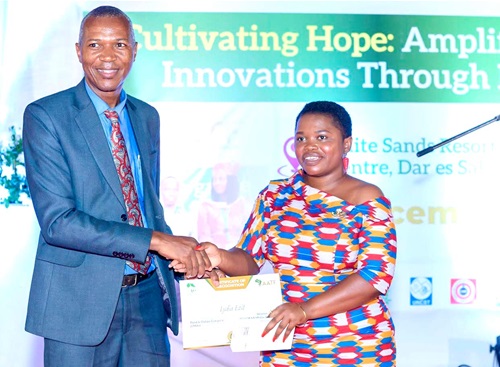
The Mirror’s Lydia Ezit wins international award
African science journalists have been urged to use simple language to report accurately on agricultural biotechnology to enable the public to better understand the concept.
The Open Forum on Agricultural Biotechnology (OFAB) project manager, Vitumbiko Chinoko, who made the call at the 2023 OFAB Media Awards Africa held in Dar es Salaam on November 29, said people still had a lot of misconceptions about the technology due to growing misinformation about biotechnology.
Awards
OFAB Africa Media Awards is an annual award sponsored by African Agricultural Technology Foundation (AATF) through its Open Forum on Agricultural Biotechnology in Africa (OFAB) project.
During the awards ceremony, African journalists who have excelled in reporting on biotechnology were honoured for their contributions to deepening understanding on biotechnology on the continent.
A senior reporter with The Mirror, Lydia Ezit, won the Online and Print category of the contest with her story: “Bt cowpea: Saviour to consumers; Good news to farmers.”
Her story had earlier won the Ghana edition of the contest.
A journalist with the Zodiac Broadcasting station in Malawi, Babache Andrew Viano, emerged as the winner for the Radio category, with Tinsae Habte Sibane from the Ethiopia Broadcasting Corporation, who won the TV category also emerging the Overall Best of the 2023 OFAB Africa.
For Mr Chinoko, one of the surest ways to help address the various misconceptions created about the technology by anti-GMO campaigners was for the media to use simple, accurate and concise language to report on the technology in order to enable the non-science community to appreciate what biotechnology really does.
He further encouraged science journalists to work closely with scientists to better understand concepts and emerging trends in biotechnology.
In a presentation on the state of biotechnology in Africa, the Executive Secretary of the Biotechnology Society of Tanzania, Emmarold Mneney, admonished the public not to be swayed by the anti-GMO campaigners who use the failed Bt cotton in Burkina Faso to deceive them to ignore biotechnology solutions.
He explained that the Burkina Faso issue with biotechnology was a problem of breeding and not an issue of technology, stressing that “this was purely a breeding problem.
The product did not meet the farmers' needs and there was no industrial analysis.”
Mr Mneney also appealed to the critics of agricultural biotechnology not to use the Burkina Faso Bt cotton experience to trash the potential of the technology.
For him, the lesson learnt in the Burkina Faso’s case is that scientists need to develop products that meet farmers' and industry needs.
The Open Forum on Agricultural Biotechnology (OFAB) media award is part of an effort to promote excellence in science journalism and appreciate the contribution of journalists in promoting sustainable agricultural technologies.
